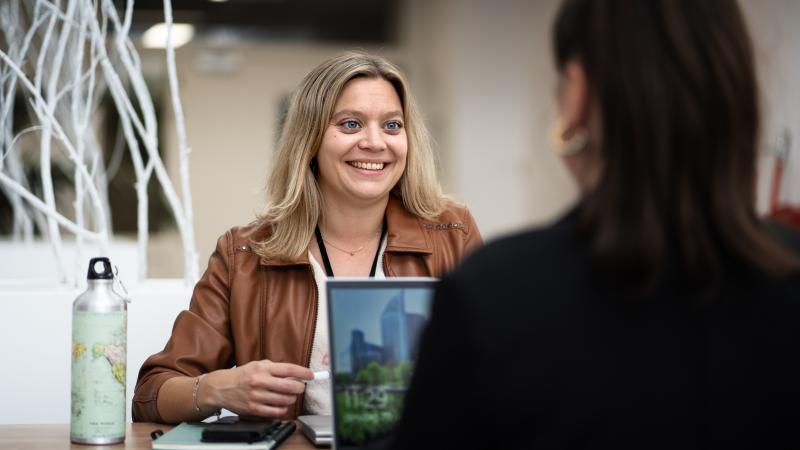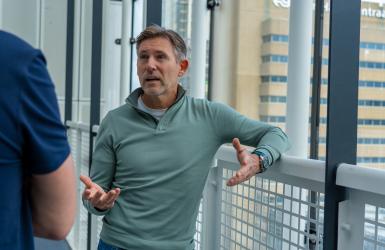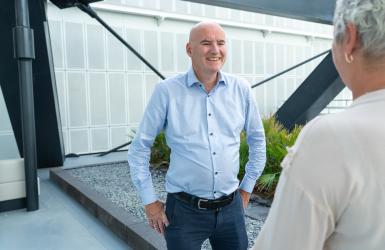The story of Marco, information analyst
‘I translate wishes into practical solutions’ Marco initially started working at the IND as a self-employed person, but he quickly felt at home…

The way in which people light up when they talk about their partner sometimes speaks volumes.
The Netherlands offers protection to people who flee their country of origin because of their sexual orientation or gender identity. The IND assesses whether someone with this reason to apply for asylum is eligible for a residence permit. ‘And that isn’t easy,’ Astrid thinks. ‘Because you can’t prove sexual orientation with documents’ As a LGBTI coordinator, she gives recommendations to her colleagues in these kinds of cases and she gives training and workshops about this subject. She does this as an extra task in addition to her job as interview and decision staff member.
‘There once was a man who found it difficult to put his feelings into words,’ Astrid tells. ‘He said he was angry because being “himself” was impossible in his country of origin. But such a statement alone is not enough in a case where sexual orientation is the reason to apply for asylum. After all, it gives little insight into this person’s real emotions or experiences. But his whole body showed me there was more behind it, so I asked him how this anger manifested itself. In response, he described how he went into his bedroom and beat his pillow and screamed into it. This body language supported his account and these are the details that help me assess its credibility. This is exactly what LGBTI cases are about: the emotions and the authentic account.’
By telling this story, Astrid also describes the complexity of LGBTI cases directly, because personal experiences and feelings cannot be supported with hard evidence. How do you assess the credibility of someone’s sexual orientation? ‘That is the biggest challenge of my work,’ Astrid thinks. ‘Each person is different and each person expresses themselves differently. Therefore, we adjust our questions to the individual situation where we can. We listen to what someone is saying, but also look at how they are saying it. And all LGBTI cases are also discussed by a coordinator after the interview, so that they can be assessed even more carefully and with the right expertise.’
As a student, Astrid already felt drawn to human and refugee rights. She wanted to devote her career to helping people on the run for persecution and violence and found her dream job with the IND. ‘Here, I am given the opportunity to make a difference in the lives of vulnerable people. I well remember an interview with a young man, who had fled because of his sexual orientation. He was tense and so anxious that he was almost too afraid to tell his story. In such cases, it is important to be patient, to take the time for someone and to create a safe environment. At the end of that interview I really saw the weight come off his shoulders. He was so relieved and grateful. This feeling, that I can help and protect someone, can’t be put into words.’
‘It isn’t just difficult interviews,’ Astrid laughs. ‘There is also time for some humour. For example, there was a lesbian couple where the partners remembered the moment they first said “I love you” to one another differently. One of them enthusiastically told me she was the first one to say it, while they were in a car on the beach together. Her partner instead mentioned another moment. When my colleague asked further questions about this in another interview, the woman had to laugh very loudly and exclaimed, “oh, did she tell you that story about the car? Yes, she always tells that story.” Well, then you also know you are dealing with an authentic account. The way in which people then light up when they talk about their partner sometimes speaks volumes.’
For the time being, Astrid is in exactly the right place with the IND. She has been working as an interview and decision staff member since 2019 and became LGBTI coordinator in 2021. ‘My colleagues and I are putting in our hearts and souls,’ she tells. ‘For me, this position is really more than a job. It’s a passion. It gives me such a great feeling to know that I’m of use here. Whether it’s providing recommendations to a colleague, interviewing and asylum seeker or improving a procedure, here I contribute to a fairer and more humane asylum process. I'm proud of this.’
Do you want to find out more about LGBTI cases and the IND? Then also read the background story Sexual orientation as a reason for asylum.

‘I translate wishes into practical solutions’ Marco initially started working at the IND as a self-employed person, but he quickly felt at home…

‘Good relationships make difficult work a lot more pleasant’ Frank has been with the Immigration and Naturalisation Service (IND) for 25 years. Although he…

‘It’s not just paperwork: behind every case there’s a person’ If you talk to Kiki, you won’t hear wild stories about courtroom drama or media storms. Her work…